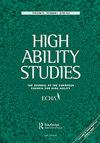师生关系与高能力学生的投入:学术风险假说视角下的探索
IF 1.3
4区 教育学
Q2 EDUCATION, SPECIAL
引用次数: 1
摘要
本文章由计算机程序翻译,如有差异,请以英文原文为准。
Teacher-student relationships and engagement of high-ability students: An exploration from the perspective of the academic risk hypothesis
ABSTRACT Teachers are key guidance figures in the lives of high-ability students. By building and maintaining close relationships with their students, teachers may heavily affect the socioemotional development of high-ability students. This study investigated how the teacher-student relationship quality affected the development of high-ability students’ academic engagement. Additionally, we examined if the teacher-student relationship quality was more important for the engagement of at-risk high-ability students (i.e. students with a low SES background or students with a diagnosed learning disability or developmental disorder). A sample of 403 Flemish high-ability students (IQ ≥ 120) reported on their behavioral and emotional (dis)engagement using scales developed by Skinner and colleagues (2009) and their relationship with their teachers using the People in My Life questionnaire (Cook et al. 1995). Multilevel growth curve analyses showed that positive and negative teacher-student relationships both contributed to the development of high-ability students’ behavioral and emotional (dis)engagement. Analyses also revealed that negative relationships had a stronger effect on the behavioral disengagement of low SES students. The emotional (dis)engagement of students with a diagnosed learning disability or developmental disorder was less affected by a negative teacher-student relationship. Results highlight the key position of the teacher in creating an engaging environment for high-ability students.
求助全文
通过发布文献求助,成功后即可免费获取论文全文。
去求助
来源期刊

High Ability Studies
Multiple-
CiteScore
4.80
自引率
11.10%
发文量
7
期刊介绍:
High Ability Studies provides a forum for scholars in a variety of disciplines associated with the development of human abilities to their highest level. It is a medium for the promotion of high ability, whether through the communication of scientific research, theory, or the exchange of practical experience and ideas. The contents of this journal are unique in reflecting concerns and recent developments in this area from childhood and across the whole life span in a variety of contexts. Far from being restricted to the traditional focus on high-level cognitive development, it also presents investigations into all other areas of human endeavour, including sport, technology, the arts, business, management and social relations.
 求助内容:
求助内容: 应助结果提醒方式:
应助结果提醒方式:


